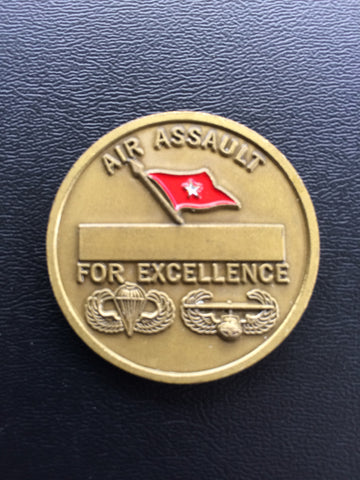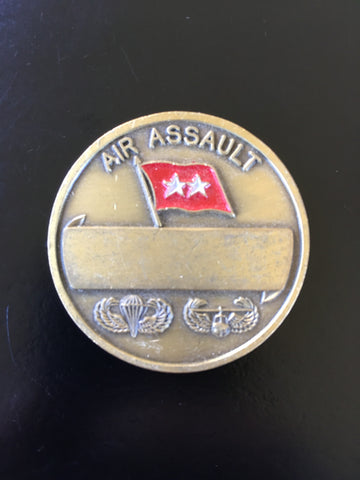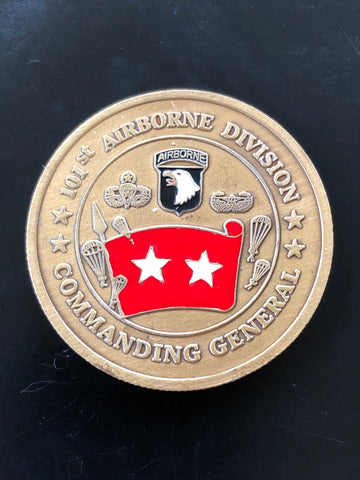Medal of Honor (MoH) Recipient MG Pat Brady (Version 2)
$ 149.99
This coin was awarded by Major General Patrick "Pat" H. Brady, United States Army, Medal of Honor (MoH) Recipient.
During his first tour in Vietnam, from January 1964 to January 1965, then-Captain Brady served as a Dust Off pilot with the 57th Medical Detachment (Helicopter Ambulance), where his commanding officer was the legendary Major Charles Kelly. After Kelly's death on July 1, 1964, Brady took command of Detachment A, 57th Medical Detachment, at Sóc Trăng. The following day, a Commander tossed the bullet that killed Kelly on Brady's desk in front of Captain Brady and asked if they were going to stop flying so aggressively. Brady picked up the bullet and replied, "we are going to keep flying exactly the way Kelly taught us to fly, without hesitation, anytime, anywhere."
MEDAL OF HONOR
For conspicuous gallantry and intrepidity in action at the risk of his life above and beyond the call of duty, Maj. BRADY distinguished himself while serving in the Republic of Vietnam commanding a UH-1H ambulance helicopter, volunteered to rescue wounded men from a site in enemy held territory which was reported to be heavily defended and to be blanketed by fog. To reach the site he descended through heavy fog and smoke and hovered slowly along a valley trail, turning his ship sideward to blow away the fog with the backwash from his rotor blades. Despite the unchallenged, close-range enemy fire, he found the dangerously small site, where he successfully landed and evacuated 2 badly wounded South Vietnamese soldiers. He was then called to another area completely covered by dense fog where American casualties lay only 50 meters from the enemy. Two aircraft had previously been shot down and others had made unsuccessful attempts to reach this site earlier in the day. With unmatched skill and extraordinary courage, Maj. BRADY made 4 flights to this embattled landing zone and successfully rescued all the wounded. On his third mission of the day Maj. Brady once again landed at a site surrounded by the enemy. The friendly ground force, pinned down by enemy fire, had been unable to reach and secure the landing zone. Although his aircraft had been badly damaged and his controls partially shot away during his initial entry into this area, he returned minutes later and rescued the remaining injured. Shortly thereafter, obtaining a replacement aircraft, Maj. BRADY was requested to land in an enemy minefield where a platoon of American soldiers was trapped. A mine detonated near his helicopter, wounding 2 crew members and damaging his ship. In spite of this, he managed to fly 6 severely injured patients to medical aid. Throughout that day Maj. BRADY utilized 3 helicopters to evacuate a total of 51 seriously wounded men, many of whom would have perished without prompt medical treatment. Maj. BRADY'S bravery was in the highest traditions of the military service and reflects great credit upon himself and the U.S. Army.
During his first tour in Vietnam, from January 1964 to January 1965, then-Captain Brady served as a Dust Off pilot with the 57th Medical Detachment (Helicopter Ambulance), where his commanding officer was the legendary Major Charles Kelly. After Kelly's death on July 1, 1964, Brady took command of Detachment A, 57th Medical Detachment, at Sóc Trăng. The following day, a Commander tossed the bullet that killed Kelly on Brady's desk in front of Captain Brady and asked if they were going to stop flying so aggressively. Brady picked up the bullet and replied, "we are going to keep flying exactly the way Kelly taught us to fly, without hesitation, anytime, anywhere."
MEDAL OF HONOR
For conspicuous gallantry and intrepidity in action at the risk of his life above and beyond the call of duty, Maj. BRADY distinguished himself while serving in the Republic of Vietnam commanding a UH-1H ambulance helicopter, volunteered to rescue wounded men from a site in enemy held territory which was reported to be heavily defended and to be blanketed by fog. To reach the site he descended through heavy fog and smoke and hovered slowly along a valley trail, turning his ship sideward to blow away the fog with the backwash from his rotor blades. Despite the unchallenged, close-range enemy fire, he found the dangerously small site, where he successfully landed and evacuated 2 badly wounded South Vietnamese soldiers. He was then called to another area completely covered by dense fog where American casualties lay only 50 meters from the enemy. Two aircraft had previously been shot down and others had made unsuccessful attempts to reach this site earlier in the day. With unmatched skill and extraordinary courage, Maj. BRADY made 4 flights to this embattled landing zone and successfully rescued all the wounded. On his third mission of the day Maj. Brady once again landed at a site surrounded by the enemy. The friendly ground force, pinned down by enemy fire, had been unable to reach and secure the landing zone. Although his aircraft had been badly damaged and his controls partially shot away during his initial entry into this area, he returned minutes later and rescued the remaining injured. Shortly thereafter, obtaining a replacement aircraft, Maj. BRADY was requested to land in an enemy minefield where a platoon of American soldiers was trapped. A mine detonated near his helicopter, wounding 2 crew members and damaging his ship. In spite of this, he managed to fly 6 severely injured patients to medical aid. Throughout that day Maj. BRADY utilized 3 helicopters to evacuate a total of 51 seriously wounded men, many of whom would have perished without prompt medical treatment. Maj. BRADY'S bravery was in the highest traditions of the military service and reflects great credit upon himself and the U.S. Army.









Share this item: